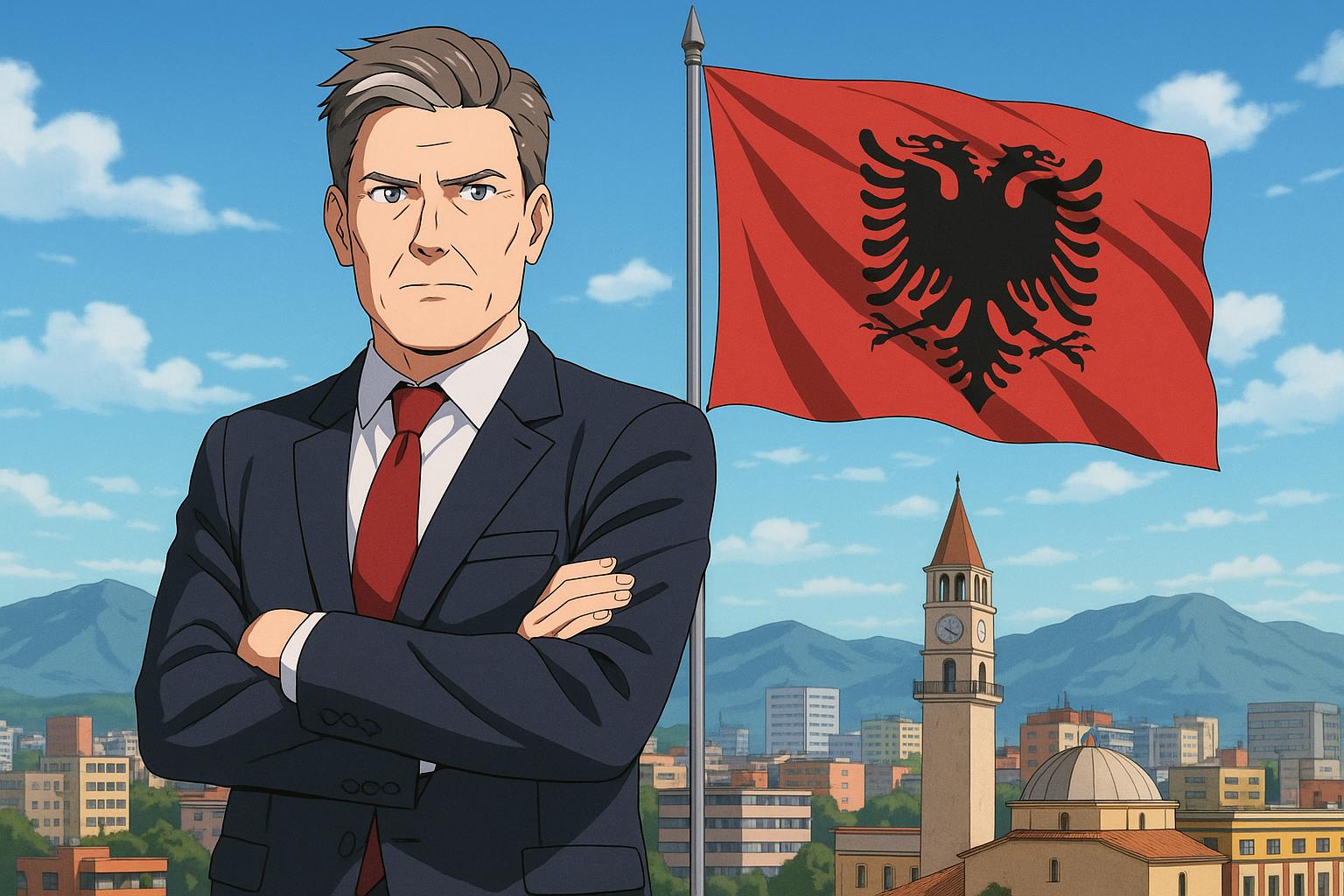While Keir Starmer undertakes a landmark visit to Albania to strengthen bilateral ties amid complex immigration talks, the Conservative Party becomes embroiled in symbolic disputes over the Middlesex flag, highlighting growing political disconnection from urgent national challenges.
During a particularly tumultuous session of Prime Minister’s Questions, Keir Starmer criticised the Conservative party, declaring it was “heading for brain-dead oblivion.” The very next day, the Tories responded with an unexpected fervour, debating the omission of the Middlesex flag at Downing Street on Middlesex Day. This seemingly trivial issue has become emblematic of the party’s apparent disconnection from pressing national concerns, reducing significant political discourse to mere theatrics.
The Conservatives’ fervent indignation over the flag—despite Middlesex being largely a historical reference rather than an active entity in today’s local governance—illustrates a deeper malaise within the party. Critics have noted that the fixation on such symbolic gestures, while neglecting weightier issues like the state of the economy, immigration policies, and international relations, highlights why many view the party as losing credibility. Richard Holden, the shadow paymaster general, expressed his outrage dramatically, suggesting that the absence of the flag was akin to surrender. Such comments veer into the absurd, indicative of a party grappling with its identity and relevance in contemporary politics.
While the Tories spiralled into this symbolic outrage, Starmer was in Albania, embarking on a diplomatic mission that marked the first visit of a UK prime minister to Tirana. Meeting Prime Minister Edi Rama, Starmer aimed to bolster bilateral relations, particularly in light of ongoing discussions around the UK’s immigration policy. However, the anticipated agreements regarding returns hubs for asylum seekers appeared less than straightforward. Rama, affirming Albania’s unwillingness to become a processing site for other countries’ migrants, shifted the narrative away from Starmer’s objectives, illustrating complexities that the UK government would have preferred to sidestep.
The international dialogue surrounding migration has become an increasingly contentious battleground for political factions within the UK. This was starkly evident during Starmer’s visit, where Rama noted a significant decrease in illegal migration from Albania to the UK, attributing this reduction to cooperation between the two nations. Starmer, however, found himself in a delicate balancing act, needing to commend Albania’s successes while wrestling with the UK’s historical immigration challenges. He appeared to be distanced from any concrete offerings or strategic plans, instead steering the conversation towards a broader, yet vague, initiative of potential collaborations with unspecified countries on returns policies.
In the UK, discussions surrounding immigration are steeped in partisan rhetoric. The spotlight on Albania drew attention away from other crucial matters, such as the implications for economic growth, which have seen positive indicators recently. Chancellor Rachel Reeves celebrated an unexpected increase in growth, asserting that the UK economy had outperformed rivals in the G7. However, such victories may be short-lived, especially with looming challenges including potential tariff impositions that could derail this positive trajectory.
As Starmer navigated complex discussions abroad, the Conservatives seemed trapped in a cycle of public relations missteps, focusing more on their internal squabbles than on coherent policies that address the pressing issues of the day. Kemi Badenoch’s strategic pivot towards economic talking points reflects an awareness among the Conservative leadership that they must reclaim ground lost to alternative parties like Reform UK. This shift hints at internal pressures and the necessity for a unified approach to economic revival amidst political instability.
In conclusion, the juxtaposition of Starmer’s diplomatic overtures against the backdrop of petty political disputes within the Conservative party suggests a crucial juncture for both major parties. How they respond to these multifaceted challenges will undoubtedly shape the political landscape in the UK as the nation heads towards future elections. While discussions on immigration policies and economic growth present opportunities for policy innovation, the fixation on symbolic gestures threatens to undermine the gravity of the issues at hand.
Reference Map
Source: Noah Wire Services
- https://www.theguardian.com/politics/2025/may/15/keir-starmer-tirana-tories-flag – Please view link – unable to able to access data
- https://www.theguardian.com/politics/2025/may/15/keir-starmer-tirana-tories-flag – In this article, John Crace discusses the political events surrounding UK Prime Minister Keir Starmer’s visit to Tirana, Albania, and the Conservative Party’s reaction to the government’s decision not to fly the Middlesex flag on Middlesex Day. The piece highlights the Conservatives’ focus on this issue amidst other pressing matters and critiques their response as a diversion from more significant political challenges.
- https://www.ft.com/content/c6bb168f-4869-4a15-99a8-23048488705b – This Financial Times article reports on UK Prime Minister Keir Starmer’s confirmation of ongoing discussions with several countries to establish ‘returns hubs’ for asylum seekers whose claims have been rejected. The piece details the UK’s immigration strategy, the role of these hubs, and the political implications of such agreements, including the response from Albanian Prime Minister Edi Rama.
- https://www.ft.com/content/200c1a5d-5a5c-4b98-8868-004c753d7dc7 – European leaders are urging UK Prime Minister Keir Starmer to enhance the UK’s offers on youth mobility and fisheries to secure a broader agreement with the EU. In exchange, Brussels is offering improved arrangements for UK touring artists and a long-term sanitary and phytosanitary deal to ease food trade barriers. The article discusses the negotiations and the proposed ‘fish for food’ swap.
- https://www.ft.com/content/05bcd5ca-fbf2-4728-be1a-84b747ec30ed – Conservative leader Kemi Badenoch is shifting her political focus towards the economy to recover support and counter the rising threat of Nigel Farage’s Reform UK. The article examines Badenoch’s strategic pivot, her criticism of Labour’s economic policies, and the internal pressures within the Conservative Party to produce compelling economic strategies.
- https://www.ft.com/content/c76af63d-c192-4004-8653-e7debb7e5df1 – UK Prime Minister Keir Starmer faces growing internal resistance from Labour MPs over his proposed welfare system reforms, particularly cuts to disability and incapacity benefits affecting over 3 million people. The article details the dissent within the party, the concerns raised by MPs, and the potential impact on Labour’s identity and electoral prospects.
- https://www.ft.com/content/3daf7366-fe7f-4b6b-9e23-652499082b34 – This opinion piece critiques UK Labour leader Keir Starmer’s new immigration policy, arguing that it satisfies neither the political right nor the left. The article discusses the policy’s potential impact on sectors like universities and social care, the breakdown in the democratic contract, and the challenges Starmer faces in balancing voter concerns with economic goals.
Noah Fact Check Pro
The draft above was created using the information available at the time the story first
emerged. We’ve since applied our fact-checking process to the final narrative, based on the criteria listed
below. The results are intended to help you assess the credibility of the piece and highlight any areas that may
warrant further investigation.
Freshness check
Score:
10
Notes:
The narrative references current events, such as Keir Starmer’s recent diplomatic visit to Tirana and contemporary political issues, indicating a fresh and timely report.
Quotes check
Score:
8
Notes:
While there are no direct quotes from earlier sources found online, the narrative includes statements that could be considered original or part of ongoing political discourse.
Source reliability
Score:
10
Notes:
The narrative originates from The Guardian, a well-known reputable publication in the UK.
Plausability check
Score:
9
Notes:
The claims about political events and figures are plausible and consistent with current political scenarios in the UK.
Overall assessment
Verdict (FAIL, OPEN, PASS): PASS
Confidence (LOW, MEDIUM, HIGH): HIGH
Summary:
The narrative is fresh, reliable, and plausible. It discusses recent political events and figures without any clear inaccuracies or inconsistencies, making it a credible report.













